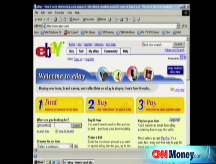eBay CEO: Tough seller rules here to stay
"We're absolutely confident of the direction we're going," eBay CEO tells investors after first-quarter earnings report shows solid sales but little new-user growth.

(FORTUNE Small Business) -- The fee and policy changes that drove sellers to boycott eBay (EBAY, Fortune 500) in February are here to stay, eBay CEO John Donahoe made clear on a call with analysts on Wednesday following eBay's first-quarter earnings report.
EBay reported revenue of $2.19 billion for the quarter ended March 31, a 24% increase over its first-quarter revenue last year, and net income was up 22%, to $562 million. The results were safely ahead of Wall Street expectations, and an indication that seller dissatisfaction hasn't led to a mass exodus from the Web's dominant auctions site.
But beneath the hood are signs of eBay's changing business dynamics. Across all of eBay's "Marketplace" properties, which include its core site and sibling e-commerce venues such as Half.com and StubHub, the company counted 83.9 million active users throughout the past year. That's just a 1% increase over the year-ago active user count of 82.9 million - a sign that eBay is reaching market saturation. In last year's first quarter, eBay's active user count grew 10%.
EBay CFO Bob Swan acknowledged during the conference call that as the tide of new eBay users slows, keeping existing customers happy becomes critical.
"We've concluded that the best way to grow our active user base is by not losing any of them," he said.
That conclusion is shaping eBay's ongoing overhaul, which began with changes in February that reduced the cost of listing new items while increasing the final-value fees eBay levies on merchandise that sells. The revamp continues next month, when eBay will implement the most controversial change in its 13-year history: sellers will no longer be able to leave negative feedback for buyers.
News of that forthcoming change ignited a firestorm of protest from sellers, but Donahoe said he is steadfast in his belief that it's a necessary move.
"We are extremely focused on improving the buyer experience on eBay," he said during Wednesday's conference call. "This is not to say that sellers are not important to us, but our belief is and has always been that what is good for buyers is ultimately good for sellers."
EBay's fee changes took effect Feb. 20, halfway through its fiscal quarter. The change had a clear effect on listings: they jumped 10% from last year's first quarter, to 647.4 million. While eBay did not disclose its conversion rate - the percentage of listings that translate to closed sales - Swan said it "declined only slightly." Meanwhile, eBay's "gross merchandise volume," the total value of items sold through its various Marketplaces sites, continued its double-digit growth, increasing 12% from last year to $16 million.
But a12% growth rate is still more sluggish than analysts would like to see, and the weak dollar may be camouflaging a slowdown: 54% of eBay's Marketplace revenue is from international sales. Strong "cross-border trade" did help eBay's numbers, Swan said. Meanwhile, the stalling U.S. economy is starting to take its toll.
"We saw a slowing in buyers' propensity to buy toward the end of the quarter," he said.
EBay plans to step up its distribution of coupons, a move it hopes will help spark more buying by existing users. The site hopes that coupons will lure once-prolific buyers who are shopping less frequently, and motivate buyers who focus on one category of goods to shop in another.
Redemption rates have been good, and eBay plans to expand the initiative, Donahoe said.
Changes are here to stay
One message repeated throughout the call: eBay is prepared to weather negative reactions to its changes, and intends to see them through.
"As we expected, some of the announcements generated a lot of passion from our community," Donahoe said - a mild way to characterize the violent seller outcry and attempted boycott that greeted eBay's announcement of its new policies. "We stayed the course on the changes that we believe are critical for the overall health of the marketplace and the long-term success of our community of users."
After the initial tidal wave of protests that met eBay's change announcement, the company did make one concession: It further reduced listings fees for media goods like books and music. More category-specific adjustments to eBay's pricing structure will be made throughout 2008, Swan said.
But eBay does not plan to back away from its broader shift toward lower initial fees with higher back-end charges on sold goods.
Other changes that alarmed some eBay merchants - including plans for PayPal to temporarily freeze funds on some high-risk transactions, and changes to eBay's "best match" search algorithm that are likely to favor larger vendors - are proceeding as planned, eBay executives affirmed.
We may have some sellers that make some noise," Donahoe said, "but we're absolutely confident of the direction we're going."
-BRANDI STEWART contributed to this report ![]()
Our full coverage of eBay's changes:
What PayPal does with your moneyEBay boycott winds down, but anger remains
EBay boycott begins, to uncertain effect
EBay seller boycott set to start Monday
PayPal funds freeze plan draws fire
Gallery: 5 PayPal alternatives
Outraged eBay sellers plot strike
Gallery: eBay backlash: 5 sellers who ditched it
Rivals court eBay sellers
Fee hike sparks seller rebellion





